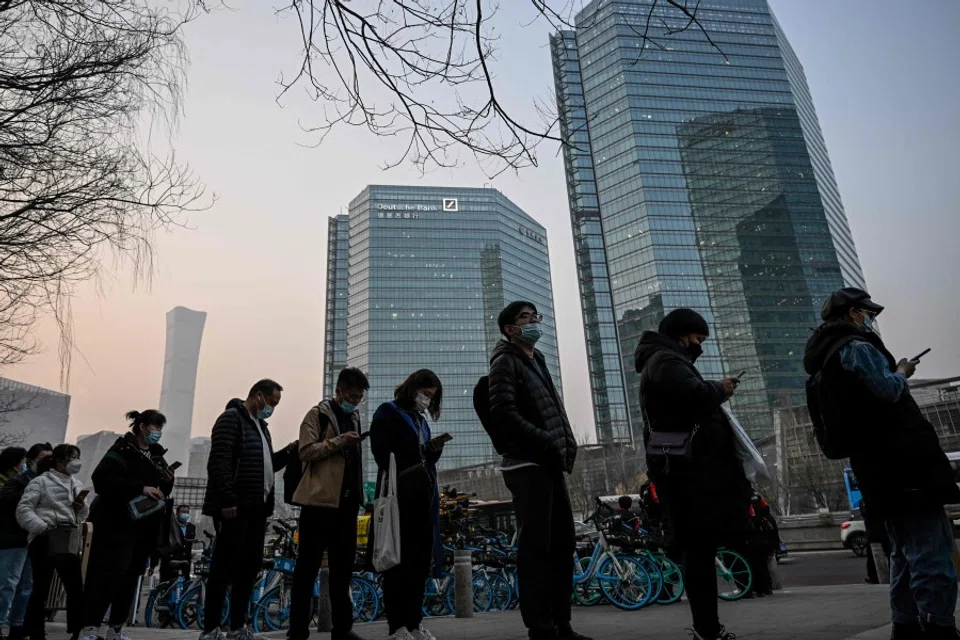Can China rally private enterprises and boost domestic demand?
China's top officials have set out the target for the country's economic growth and drivers for 2023, but the real work is just beginning. To meet economic growth targets and ensure economic recovery, it seems that the basic idea is to boost domestic demand and support the private sector.

"This year, consumer spending can become the main driver of economic growth and better play a fundamental role in growth."
National Development and Reform Commission vice-chair Li Chunlin emphasised the importance of consumer spending in China's economic recovery at a press conference on 6 March, in response to a question from Lianhe Zaobao. He highlighted that given the general environment of weak external demand, boosting domestic demand will be the top priority in this year's economic efforts.
Focus on domestic demand
Despite strong rebounds in several key economic indicators in the first two months of this year, China announced on 5 March an official economic growth target of just 5%, lower than most market expectations. Evidently, the authorities do not hold an optimistic outlook for this year.
The government work report from the Two Sessions (两会, Lianghui), or annual meetings of the National People's Congress and the Chinese People's Political Consultative Council, acknowledged that China is facing many difficult challenges. It said, "Uncertainties in the external environment are on the rise. Global inflation remains high, global economic and trade growth is losing steam, and external attempts to suppress and contain China are escalating." At the same time, domestically, "insufficient demand remains a pronounced problem, and the expectations of private investors and businesses are unstable".
... the authorities will tap into various channels to increase urban and rural incomes, stabilise big-ticket spending, and push for a recovery in spending on lifestyle services.

In setting out this year's economic efforts, the report emphasised that the focus will be on growing domestic demand, stressing that the top priority is on the recovery and growth of consumer spending. To this end, the authorities will tap into various channels to increase urban and rural incomes, stabilise big-ticket spending, and push for a recovery in spending on lifestyle services.
Figures released by the General Administration of Customs on 7 March revealed that China's imports and exports saw negative growth for four consecutive months. Tommy Xie, Head of Greater China Research & Strategy at OCBC Bank, assessed that the exports that supported China's economy last year might be a burden to economic growth this year amid the slowdown in global economic growth. "Hence, this year's economic efforts will focus on growing domestic demand," he said.
Xie noted that the first step in growing domestic demand is to improve the employment situation and raise incomes to boost consumer confidence. Given the record number of tertiary graduates this year, one of the main challenges for policymakers is ensuring sufficient employment through policies.

Some 11.58 million tertiary graduates are expected to enter the workforce this year, 820,000 more than last year. The Chinese government plans to add 1 to 1.2 million people to the urban workforce, while maintaining the surveyed urban unemployment rate at around 5.5%.
... in addition to boosting domestic demand through infrastructure investment, policymakers could further ease the burdens of taxes and fees on the service industry. - Professor Chen Bo, Director of the Optical Valley Institute for Free Trade
Supporting the private sector
The authorities also raised the budget deficit from 2.8% last year to 3% this year, and increased local government special purpose bonds from 3.65 trillion RMB to 3.8 trillion RMB. The government work report proposed stimulating social investments through government investments and policy incentives, and encouraging and attracting more private capital to major construction projects, to boost private sector investments.
Professor Chen Bo, director of the Optical Valley Institute for Free Trade, suggested that in addition to boosting domestic demand through infrastructure investment, policymakers could further ease the burdens of taxes and fees on the service industry.
He recommended providing subsidies and concessional loans to related enterprises, and for the more prosperous cities to issue consumption vouchers, while speeding up recovery on both the supply and demand sides of the service industry. "Only when support measures are accurately implemented can business and consumer confidence be rebuilt," Chen told Zaobao.

From stabilising employment to boosting consumption, the role of the private sector is indispensable in implementing measures to expand domestic demand. Based on official statistics, the private sector contributes more than 50% of China's tax revenue, more than 60% of the country's GDP, and more than 80% of urban employment.
However, over the past three years, China's strict anti-Covid policy has disrupted the operations of private enterprises, while the regulatory crackdowns aimed at preventing the disorderly expansion of capital have dealt a big blow to the internet and private education industries, severely affecting the confidence of the private sector. The Financial Times reported that as many as 500 new Chinese companies have redomiciled or registered in Singapore last year, a significant rise from previous years.
As China's economic pressure increases, the Central Economic Work Conference held last year no longer called for preventing the disorderly expansion of capital but rather stressed the importance of encouraging and supporting the growth of the private sector and enterprises in terms of policy and public opinion.
Chinese President Xi Jinping also reiterated the country's support for the private sector during the Two Sessions this year, calling private enterprises and entrepreneurs "one of us" and urging them to "eliminate worries, lay down burdens and develop boldly".
"But amid an increasingly complex external environment, to what extent will the central government be able to delegate authority? Can local governments keep up? If policies are not implemented properly, it is just empty talk at the end of the day." - Pei Sai Fan, Adjunct Professor, National University of Singapore
More autonomy needed
Dr Pei Sai Fan, adjunct professor at the National University of Singapore and former banking department director of the Monetary Authority of Singapore, pointed out that the wording of the government work report shows that officials are aware of the problem, and that it is now their call to implement policies that would benefit the private sector.

Pei analysed that, as China's economy shifts from being external demand-driven to domestic demand-driven, the government should give more autonomy to private enterprises to stimulate market vitality.
He explained, "The central government is right in wanting to simplify administrative procedures and delegate more central government powers to local governments and market players, and to balance control with decentralisation.
"But amid an increasingly complex external environment, to what extent will the central government be able to delegate authority? Can local governments keep up? If policies are not implemented properly, it is just empty talk at the end of the day."
At the Two Sessions this year, Li Qiang, a newly promoted member of the Politburo Standing Committee, is expected to take over as premier and take charge of China's economy. With Li's rich working experience in Jiangsu, Zhejiang and Shanghai - regions with a developed private sector - Pei expects the new economic helmsman, described by entrepreneurs as down to earth and pragmatic, to promote reforms more effectively.
He surmised, "Li not only has a deeper understanding of the problems faced by enterprises but also has Xi's trust. I hope that he will be able to further relieve the burden on private enterprises and boost domestic demand."
This article was first published in Lianhe Zaobao as "发改委强调消费对复苏重要意义 提振内需是中国今年经济工作重任".
Related: Chinese provinces' battle for talents and workers after Chinese New Year | China local governments' fiscal stress may roll over to 2023, think tank warns | Shanghai's new leader Chen Jining's all-out effort to boost economy: Will it work? | Uneven recovery ahead for China's economy | China and the world renew economic ties post-pandemic | How Chinese private firms can be made more confident of the government's support




![[Photos] Fact versus fiction: The portrayal of WWII anti-Japanese martyrs in Taiwan](https://cassette.sphdigital.com.sg/image/thinkchina/3494f8bd481870f7c65b881fd21a3fd733f573f23232376e39c532a2c7593cbc)
